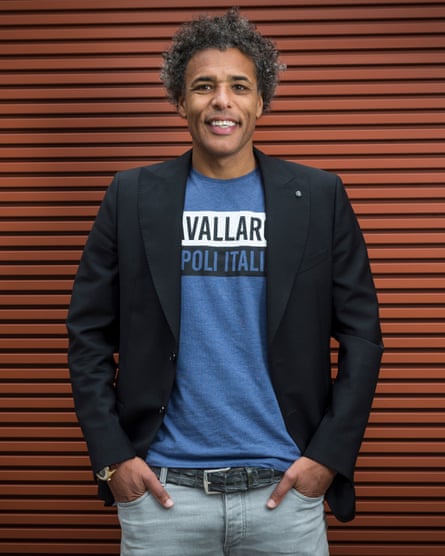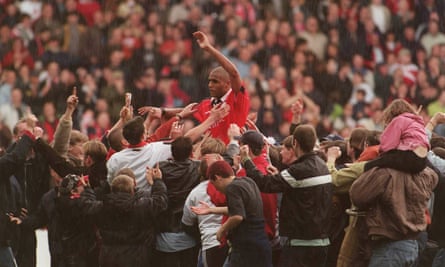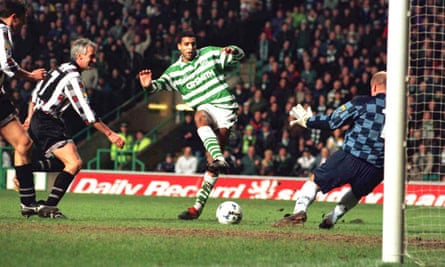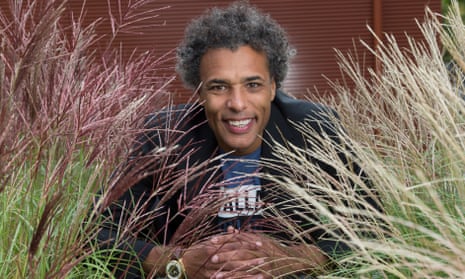Pierre van Hooijdonk does a very good Ron Atkinson impression. It is genuinely funny as, in the lobby of an Amsterdam hotel, he tries in vain to collapse his 6ft 4in frame into something resembling Big Ron. The Dutchman’s accent and intonation, however, are spot on as we discuss his final few months under Atkinson at Nottingham Forest in 1998-99, when the club was relegated from the Premier League. They have not been back since.
“Despite being bottom of the league, Ron had just appeared in a Carling advert as some sort of clueless medieval king who had just discovered football,” Van Hooijdonk says. “I remember one training session afterwards where I was pissed off with the whole situation and I cursed loudly. Ron replied: ‘If you don’t like it, why don’t you fuck off?’ So I did, and as I walked off the training pitch I shouted: ‘The only reason they asked you on that beer ad is because you are the biggest pub manager in the country.’
“Later that afternoon, Ron called me at home to come and see him in his office. He was smiling and said: ‘I liked your joke. A couple more games are left, you can leave after that, just give your best.’
“We laughed it off. Ron was a people person and I can imagine him doing better with the right group of players. He was funny, warm, even if his tactical approach was the same as Dave Bassett’s. And all the players were pissing themselves when he got into the wrong dugout in his first game in charge.”
It proved a rare moment of lightness in a turbulent time for Forest and Van Hooijdonk, who had fired the club to the 1997-98 First Division title the previous season with 34 goals, scored at the World Cup for the Netherlands and then spent the first few months of the next season on strike after failing to secure a move away from Forest.
“The thing that started all that was after the World Cup Newcastle and Ruud Gullit came in with a £7m bid, twice what Forest had paid,” Van Hooijdonk says. “But Bassett told the papers my price was £10m. Ten million! In 1998, that’s like putting a price tag on a bottle of water and asking for £25. Officially it’s for sale but it’s not for sale.”
Van Hooijdonk would not play in the first team until November, eventually reintegrated by a now‑desperate Bassett, who would be sacked and replaced by Atkinson two months later. Van Hooijdonk is withering in his assessment of the former Wimbledon manager.
“Bassett’s training was primitive. We played five-a-side most of the time. We would do drills where the goalkeeper, Dave Beasant, was playing up front. Bassett wasn’t there most of the time. Then, on a Friday, he would turn up. Before matches we would just go to an Italian restaurant opposite the City Ground. We could order what we wanted: chicken wings, carbonara with loads of sauce, french fries, whatever.”

Bassett was not the only obstacle for Van Hooijdonk. Some players publicly made their feelings known about the Dutchman, and in one game refused to celebrate one of his goals. While Van Hooijdonk was on strike, Steve Stone said he “couldn’t give a shit what Pierre does next” and said the striker was not welcome in the dressing room. “Why was it that no foreign player at Forest was interviewed?” Van Hooijdonk says. “To this day, there is not one foreign player from my time at Forest that has said something bad about me.
“When I returned that November, I called a meeting with the players in the dressing room, explained the reasons I stayed away in bullet-point form and asked if anyone had any questions. That was their time to say something, face to face. All the guys who said something when I was away stayed quiet. Only one person, Geoff Thomas, said he didn’t agree with me. And I respected Geoff for that.
“People can say I went on strike but I believe nobody can say that as a colleague and a professional I was an asshole.”
Forest were understandably reluctant to let Van Hooijdonk go. He was the club’s best striker since Stan Collymore and Teddy Sheringham, a two-footed, world-class set-piece specialist, and did not look out of place alongside Dennis Bergkamp and Patrick Kluivert in an orange shirt. He eventually left for Vitesse Arnhem in the summer of 1999 for £3.5m.
He had arrived at Forest from Celtic, with his spell in Glasgow also controversial. “In Scotland, every day the papers are on you, mad for Celtic and Rangers. But at Forest, it was not the same. I didn’t miss the attention but you noticed the difference.

“In Glasgow, I was easy to recognise: tall and dark. I got some trouble from Rangers fans; once at some traffic lights a boy opened my car door and spat at me. It sucked the energy out of me.
“I was single for six months there but didn’t go out because I had to be careful. If I went to a concert, I would take a taxi and crouch down in the back seat as we went past the pubs. Even when I was playing for Fenerbahce with the Galatasaray fans or for Benfica with the Porto fans, the danger was never as bad.”
Van Hooijdonk made an immediate impact for Celtic, scoring a famous 1995 Scottish Cup final winner – the club’s first trophy for six years – and the next season would be the league’s top scorer with 26 goals. Paolo Di Canio and Jorge Cadete would later join to form a frontline known as the Three Amigos.
“When I arrived at Celtic in 1994 I was not impressed with the quality,” Van Hooijdonk says. “But when Andreas Thom joined, then Jorge and Paolo, the difference in level was unbelievable. It was a great partnership.
“John Collins had taken me to his home for dinner when I had joined, so when the other foreigners arrived I did the same. Andreas at the time was smoking cigarettes and so was my wife, so he felt safe at my home. He was from East Germany; they are a little bit different, more suspicious.
“Paolo also came round. At the ‘96 Olympics the volleyball final was between Holland and Italy. I said to him after training that he should come to my house to watch. It was my first time meeting him properly and I thought he was going to be relaxed, but he was on the floor, rolling around, screaming with passion at every point. Paolo was a funny guy – he once called a team meeting because Andreas had not passed the ball to him.”

Di Canio, Cadete and Van Hooijdonk would all leave Celtic in acrimony, with the Dutchman falling out with the chairman, Fergus McCann, over a new contract, declaring Celtic’s offer of £7,000 a week was “enough for the homeless but not for an international striker” in 1996.
“Our best players were on five‑figure sums per week and I was not,” Van Hooijdonk says. “McCann said if I did well he would raise my salary. I became top scorer but he never offered me the same money as the others. I’m a man of my word.”
Van Hooijdonk’s goal record is astonishing: 335 in 551 games, including at least a goal every other game for seven clubs between 1991 and 2005. His pinnacle was the Uefa Cup triumph with an unfancied Feyenoord in 2002, alongside a young Robin van Persie. Van Hooijdonk scored in every knockout round, including two goals in the final (in Rotterdam) against Borussia Dortmund, one a trademark free-kick.
Remarkably, at 49, Van Hooijdonk plays for a Sunday league team. He is still besotted by football and easy to talk to: about how he spent his pocket money as a kid on hiring a sports hall because it had a goal with a net, or about Harry Kane, or his 19-year-old son, Sydney van Hooijdonk, a striker for his hometown club, NAC Breda.
Articulate and passionate, it is perhaps unsurprising he works as a TV pundit in the Netherlands. It allowed him to visit Glasgow last month for Feyenoord’s match against Rangers, where he paid tribute to his former teammate Fernando Ricksen at Ibrox.
🙏🏽🙏🏽🌹 #fernandoricksen pic.twitter.com/vML0GOVIqN
— Pierre van Hooijdonk (@pierrevh17) September 19, 2019
“I knew Fernando through the national team and could not miss out on the opportunity to show my respects,” he says.
It seems some of the Glasgow confrontation has died down. “Some Rangers fans even said hello to me.”

Comments (…)
Sign in or create your Guardian account to join the discussion